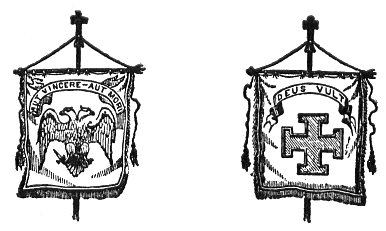“You here behold a part of those unknown legions which are united by indissoluble bonds to combat for the cause of humanity. Are you willing to make yourself worthy of watching with them for the sanctuary? Your heart must be pure, and a heavenly ardour for the dignity of nature must fire your breast. The step you are taking is the most important one of your life. Our games are not vainly ceremonial. In creating you a knight we expect of you that you will perform exploits grand, noble, and worthy of the title you receive. Long life to you, if you come to us to be faithful; if honest and good you answer our expectations. Should you prove a false Brother, be both cursed and unhappy, and may the grand Architect of the Universe hurl you into the bottomless pit! Now bend thy knee, and on this sword take the oath of the Order.”
At these words the Prefect seats himself, the Knights are standing with their swords drawn, and the Candidate pronounces the following oath:—
p. 462
“I promise obedience to the excellent Superiors of the Order. In as much as it shall depend upon me, I engage—never to favour the admission of any unworthy member into these holy degrees—to labour at rendering the Ancient Masonry triumphant over the false systems which have crept into it—to succour, like a true Knight, innocence, poverty, or oppressed honesty—Never to be the flatterer of the great, nor the slave of Princes;—to combat courageously, though prudently, in the cause of Virtue, Liberty, and Wisdom—to resist boldly, both for the advantage of the Order and of the world, Superstition and Despotism. I never will prefer my own private interest to that of the Order. I will defend my Brethren against calumny. I will dedicate my life to the discovery of the true Religion and real doctrines of Freemasonry, and I will impart my discoveries to my Superiors. I will disclose the secrets of my heart to my Superiors as to my best friends. So long as I shall remain in the Order I shall look upon the being a Member of it as a supreme felicity. I also engage to look upon all my domestic, civil, and social duties as most sacred. So help me God, both for the happiness of my life, and for the peace of my mind.”
In return for this oath the Prefect declares to the Candidate that he is going to create him a Knight of St. Andrew, according to the ancient usage of the Scotch—”Rise,” he says, “and in future beware of ever bending thy knee before him who is only man like thyself.” 6
To these ceremonies the adept Knigge added a certain number of others which were mere derisions of the rites of the Church. Such, for example, was the triple benediction which the Priest pronounced over the new Knight, such the atrocious mockery of the last supper, which terminated the ceremony. But, impious as is the imitation, Weishaupt declares it to be disgusting because it is still religious, theosophical, and borrowed from superstition. 7 But what perfectly coincided with the views of the Bavarian founder were, the instructions given to the new Knight. He is enraptured with that discourse, where one may observe the Illuminizing Orator selecting the most impious, artful, and disorganizing systems of Masonry, to make them at once the mysteries of their Masonic Lodges, and an immediate preparation for those of Illuminism.
Let the reader recal to mind what was said in the Second Volume of these Memoirs 8 concerning the Apocalypse of the Martinists, entitled Of Errors and of Truth. He will there have read of a time when man, disengaged from the senses and free from matter, was still more free from the yoke of the laws and from political bondage, to which he was only subjected by his fall. He will there have seen, that the daily efforts of man should tend to the overthrow of Governments, that he may recover his former purity and ancient liberty, and thus retrieve his fall. I might there have demonstrated that absurd Idealism reducing our senses to vain fictions, that the prostitution of them might be but a chimerical crime; 9 there, in short, I might have shown, according to the Martinist, that in all ages this system of corruption and disorder has been the doctrine and secret of true Philosophy. This intermediary degree was destined by Weishaupt to serve as a point of union between the Masonic Lodges and Illuminism. It was but natural that the should have selected the most

Moe is the founder of GnosticWarrior.com. He is a father, husband, author, martial arts black belt, and an expert in Gnosticism, the occult, and esotericism.




